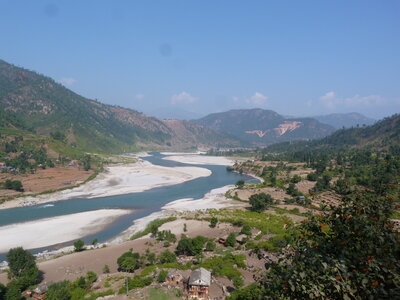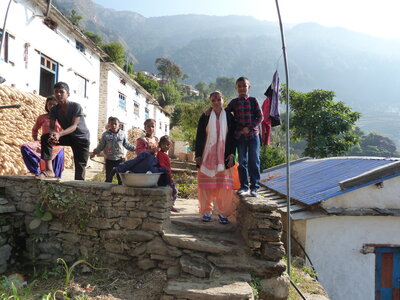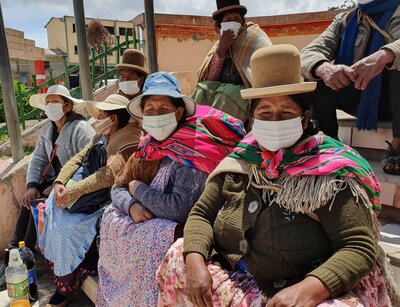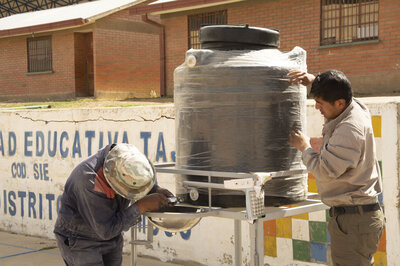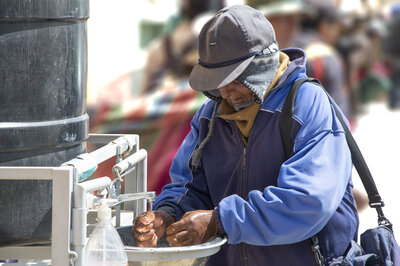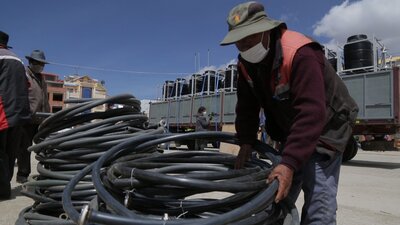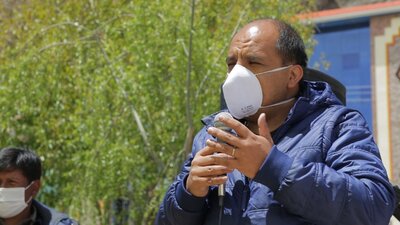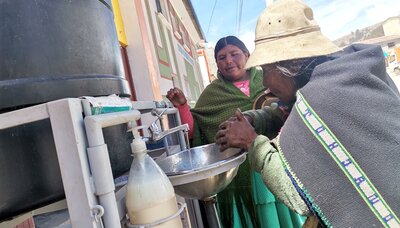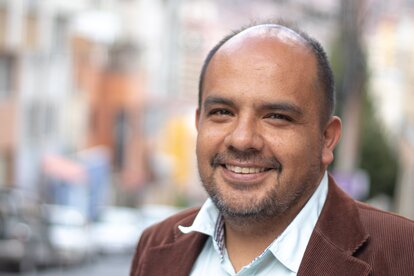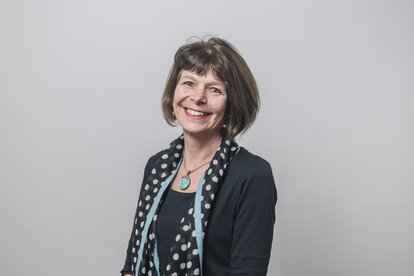This success story allows us to travel from the Himalayas to the Illimani. HELVETAS promotes the healthy habits that saves lives.
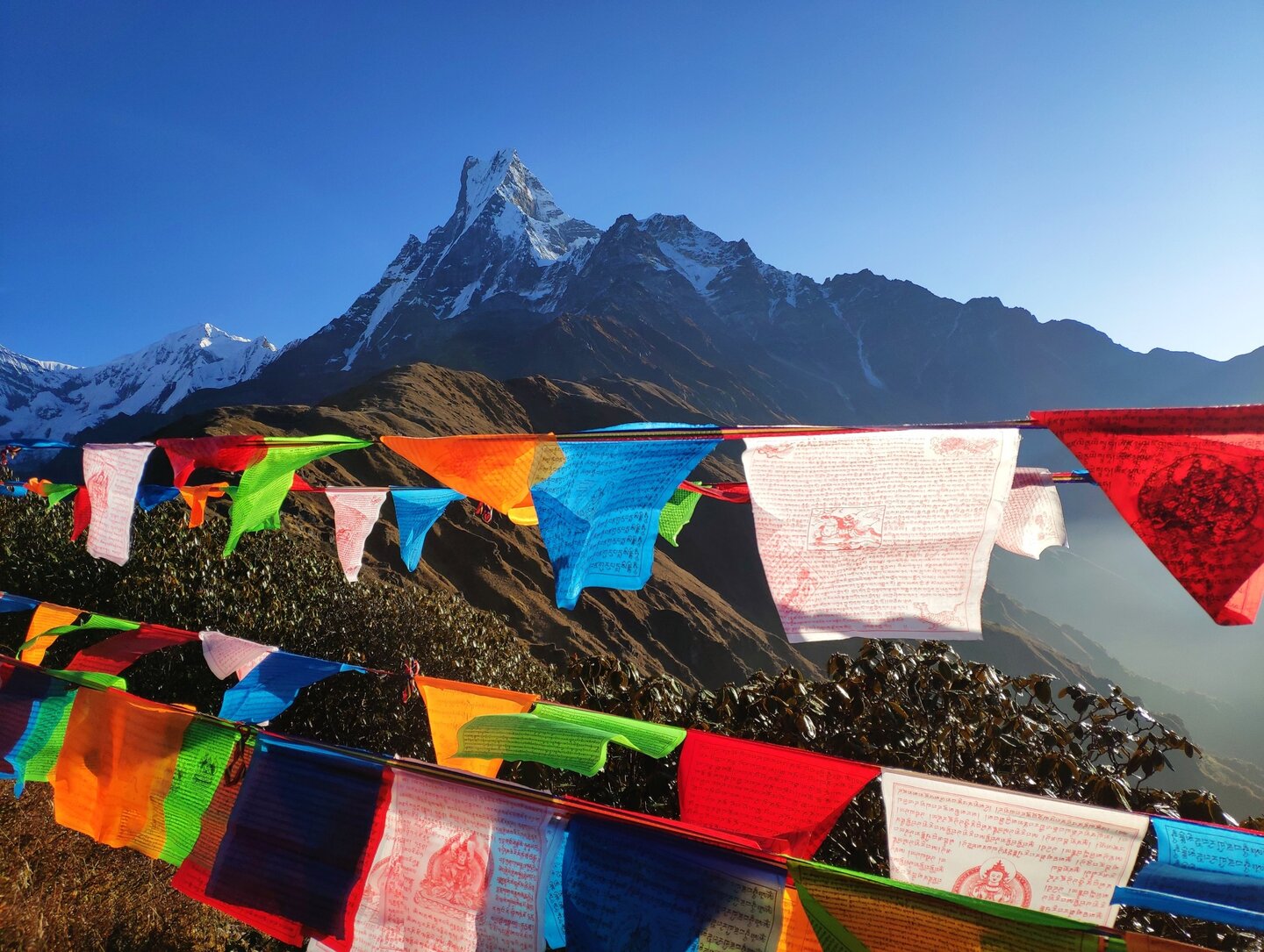
The Himalayas are the immense Asian mountain range spread across Bhutan, China, India, Pakistan and Nepal. The name comes from Sanskrit: ‘hima’ means snow and ‘alaya’, abode or placethe immense Asian mountain range spread across Bhutan, China, India, Pakistan and Nepal. The name comes from Sanskrit: ‘hima’ means snow and ‘alaya’, abode or place. Very important rivers such as the Ganges, Indus, Brahmaputra, Yamuna and Yangtze are born in the Himalayas, and it is amazing to know that more than 1.3 billion people live around these watercourses.
Yes... Himalayan snow feeds rivers and hundreds of lakes, in addition to diverse ecosystems of richly varied fauna and flora. The Indus is one of the longest rivers, beginning in Tibet and flowing to the Arabian Sea. Mount Everest, known for its height that reaches 8,848 meters, Mount Kanchenjunga (8,586 m.) and Mount Lhotse (8,501 m.) are the main peaks of the Himalayas. Also in the Himalayas is Nepal, a mountainous country where the famous Everest is located. And in the northwest of Nepal is the mountainous province of Karnali, named after the river that flows through its territory.This culturally and linguistically diverse region faces challenges due to inaccessibility, seasonal water shortages and the high rates of poverty.
Multiethnic, multicultural Nepal is characterized by great natural beauty and rich biodiversity, although many of its inhabitants struggle to gain a livelihood.
Lying on the other side of the world from Nepal is Bolivia. A country located at the heart of South America whose name derives from the family name of Liberator Simón Bolivar. This plurinational and multiethnic country has 36 indigenous languages spoken across its territory.
The Andes cross Bolivia, passing through the Chaco and the Amazon. Thanks to the diversity of ecological zones, Bolivia is a territory with a rich biodiversity. In Bolivia, enigmatic places such as the Uyuni Salt Flat stand out as well as basins such as the Amazonas, Plata and Central or Lacustre basins. In the Central basin, the highlands shine with rivers, lakes and lagoons linked to the Andes mountain range. The most important river is the 436 km long Desaguadero, and Lake Titicaca, the highest lake in the world at 3,810 masl. Bolivia also has an energetic flow of snow-capped mountains, with Mount Sajama (6,542 m.), Mount Illampu (6,485 m.) and Mount Illimani (6,462 m.) as living examples.
The name of Mount Illimani dates back to pre-Hispanic times, when the Aymara inhabitants called it Illemana which means, “where the sun is born”; others called it Jilir-Mamani or eldest son. The Illimani is considered the main Achachila of the city of La Paz, which in the Aymara culture means “protective spirit”.
HELVETAS has been working in Nepal since 1956, developing actions in the areas of: Governance and Peace; Sustainable and Inclusive Economy; Skills Development and Education; Water and Infrastructure; Environment and Climate Change. HELVETAS has worked on many topics during its long engagement in Nepal. Early work on trail bridges, technical education and dairy expanded into work on governance, climate-smart agriculture, and the provision of water.
A common story between Nepal and Bolivia is the tenacity and effort of the people of both countries to obtain water, especially in a time of pandemic when a central barrier to containing the disease and the spread of COVID-19 is handwashing, which according to the World Health Organization requires 20 to 30 seconds.
In both Nepal and Bolivia, water is a valued resource, but extremely scarce in some areas. In HELVETAS Nepal, the WASH team recognizes water for consumption, sanitation and hygiene as a human right and a basic requierement for a decent life. Any technology implemented must be based on the “3 R’s”: water Retention, Recharge and Reuse. In that framework, and especially in response to the COVID-19 pandemic, the team developed a series of messages about the importance of proper handwashing.
One concern observed by the Nepal team was that, while handwashing is important, when many people use the same washing station the risk of contagion through cross-contamination may increase, because they are, in direct contact with the tap, liquid soap dispenser or other input. This concern became a challenge for the technicians and encouraged the development of prototype handwashing stations for ensuring the efficient use of water, based on water savings, without handwashing becoming a source of contagion. This was how in a small workshop in Birendranagar, the provincial capital of Karnali, the portable sink mechanism was perfected.
After several tests, the sink was finally ready. It is patent-free. The operating mechanism is simple: the user presses a foot pedal located on the right-hand side, which allows water to come out of the tap. When pressing the left-hand foot pedal, the mechanism dispenses liquid soap. This reduces misuse of water and prevents user contact with the tap or liquid soap dispenser. Above all, it encourages handwashing.
When Mohanmaya Dhakal, Deputy Mayor of Birendranagar municipality, learned that HELVETAS Nepal had developed pedal-based handwashing stations, she requested the installation of one at the Birendranagar municipal office. Since many citizens visit the office for various services, this was good publicity for handwashing as a mesure to prevent the spread of COVID-19. Subsequently, other municipalities ordered hand-washing stations.
Birendranagar’s small workshop is now very busy, manufacturing more hand-washing stations that are assigned to public places, promoting the healthy habit of handwashing. This experience shows a simple and practical measure implemented effectively. This good practice developed by HELVETAS in Nepal traveled thousands of kilometers, crossing the Himalayas, to reach the Illimani in La Paz, Bolivia, thanks to the effective power of social networks.
In a time of pandemic, water has become the star resource to fight the disease, because together with soap, it is the main barrier to prevent contagion, by washing hands.
In La Paz, municipalities such as Escoma, Moco Moco, Puerto Carabuco and Puerto Acosta had no facilities in place to ensure that people could wash their hands as often as required during a pandemic. As an emergency measure, the authorities in Escoma, for example, decided to put four buckets (with water) on the four corners of the main square, so that the people walking in that area could use the water in that container, as well as the bar of soap which was placed on a table and made available to the population.
The problem was that people were in direct contact with the tap where the water flowed from the bucket and the bar of soap. This impled a risk of contamination, rather than being a barrier to diseases.
Through the Integral Water Management project of the Development Cooperation office of the Swiss Embassy in Bolivia, which implements actions in the Suches basin in La Paz, and in Cotagaita in Potosí, HELVETAS Bolivia decided to act in the municipalities, promoting handwashing, but accompanying the promotion of this healthy habit with the required infrastructure, i.e. with portable sinks.
A modest workshop located in Viacha, 31 kilometers from the city of La Paz, was the place where 120 portable sinks were built using the designs and experience of HELVETAS Nepal.
Mario Alanoca, who works in the company “Industrias Metalúrgicas Gutiérrez” and who is a member of the team of ten people who built the hand-washing stations, explained that this was the first experience in building this type of equipment.
“Thanks to the solid structure, the pedal system, the fact that there is no contact with the tap and the liquid soap dispenser, users can use the pedals and avoid contact with anything that may be contaminated. Especially with children in mind, this is of great benefit, particularly in times of COVID-19,” stressed Mario.
His eyes were filled with joy when pointing out excitedly that “doing this job also meant a job and salary for ten families that had the opportunity to build these sinks”.
The sinks went to the municipalities where the Integral Water Management Project works, with the commitment of the authorities to provide water and liquid soap for operation. Victoria Yana, councilor of the municipality of Escoma, said that “having the sinks is very important, especially thinking of the health of children and young people in the municipality, to prevent diarrhea or COVID-19”.
Marisol Huanca is a cheerful girl who is in the 5th grade of the “Pacífico Feletti” Primary School in Escoma. She misses going to school and playing with her thirty classmates on the playground. However, she knows that as long as COVID-19 is not overcome, probably school will not be in-person. She feels that the portable sink will be a great help for people to wash their hands and she says that
Marisol Huanca, elementary student, Bolivia.
The Cooperation for the Development of the Swiss Embassy in Bolivia, together with HELVETAS, has managed to reach municipalities in the departments of La Paz and Potosí with this infrastructure. In La Paz alone, the Integral Water Management project delivered a total of 185 sinks to the municipalities of Charazani, Escoma, Moco Moco, Puerto Acosta, Puerto Mayor de Carabuco, Pelechuco, Humanata, Curva, and also to the Apolobamba Nature Reserve Area. The estimated cost of each sink was BOB 2,290, equivalent to USD 329. The sinks were distributed to schools, markets and places where people circulate and need a space to wash their hands.
Since March 2019, when the first case of COVID-19 was reported in Bolivia, and until the third week of January 2021, more than 198,000 people have been infected with this disease, according to the Ministry of Health and Sports. These figures demand urgent actions aimed at preventing contagion and promoting healthy habits.
The experience that was born in Nepal, at the foot of Mount Everest, and traveled to Mount Illimani in Bolivia, is an example that knowledge has no borders and that with effort, creativity, positive energy and solidarity, it is possible to build and learn in times of pandemic.
From the Himalayas to the Illimani... using water, saving lives
Production: Rigliana Portugal, Specialist in Knowledge Management and Communication, HELVETAS Swiss Intercooperation - Bolivia
Javier Zubieta, Manager Subprogram Economic Development and Inclusive Entrepreneurship, Director Integral Water Management
Project Review: Jane Carter, Senior Advisor, Natural Resource Governance, HELVETAS Swiss Intercooperation
Photos: Madan Bhatta, Jane Carter, Sanjay Hona, Marcelo Sarmiento, Rigliana Portugal, HELVETAS Nepal, and Integral Water Management, Swiss Agency for Development and Cooperation - Bolivia, HELVETAS Bolivia.
January 2021
This document was prepared within the framework of the process for the systematization of best practices of the Integral Water Management Project of the Cooperation for the Development of the Swiss Embassy in Bolivia, implemented by HELVETAS Swiss Intercooperation - Bolivia.
HELVETAS Nepal is grateful for the support of Charity: Water, which allowed the original development and distribution of the handwashing stations in Nepal.




















